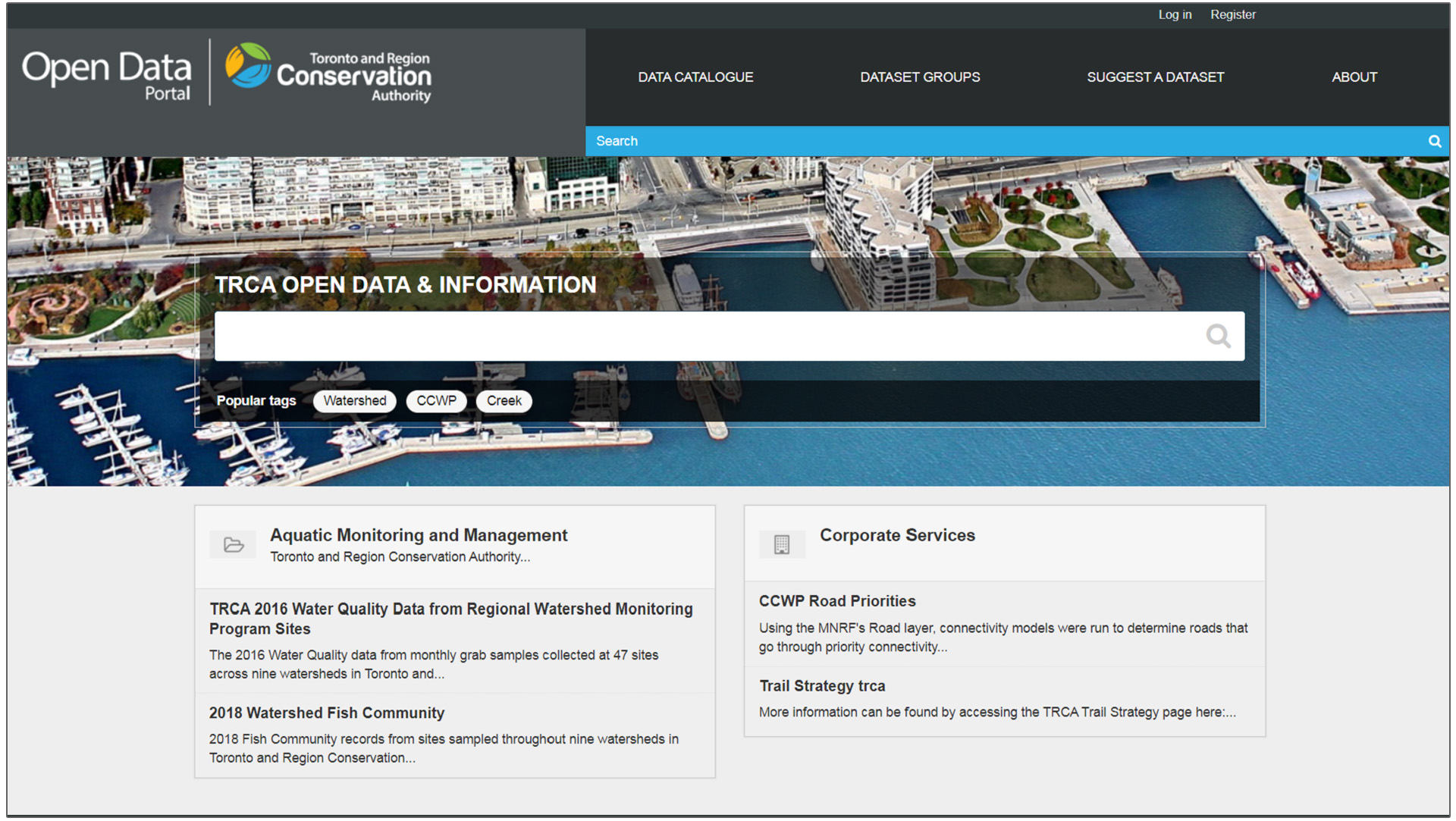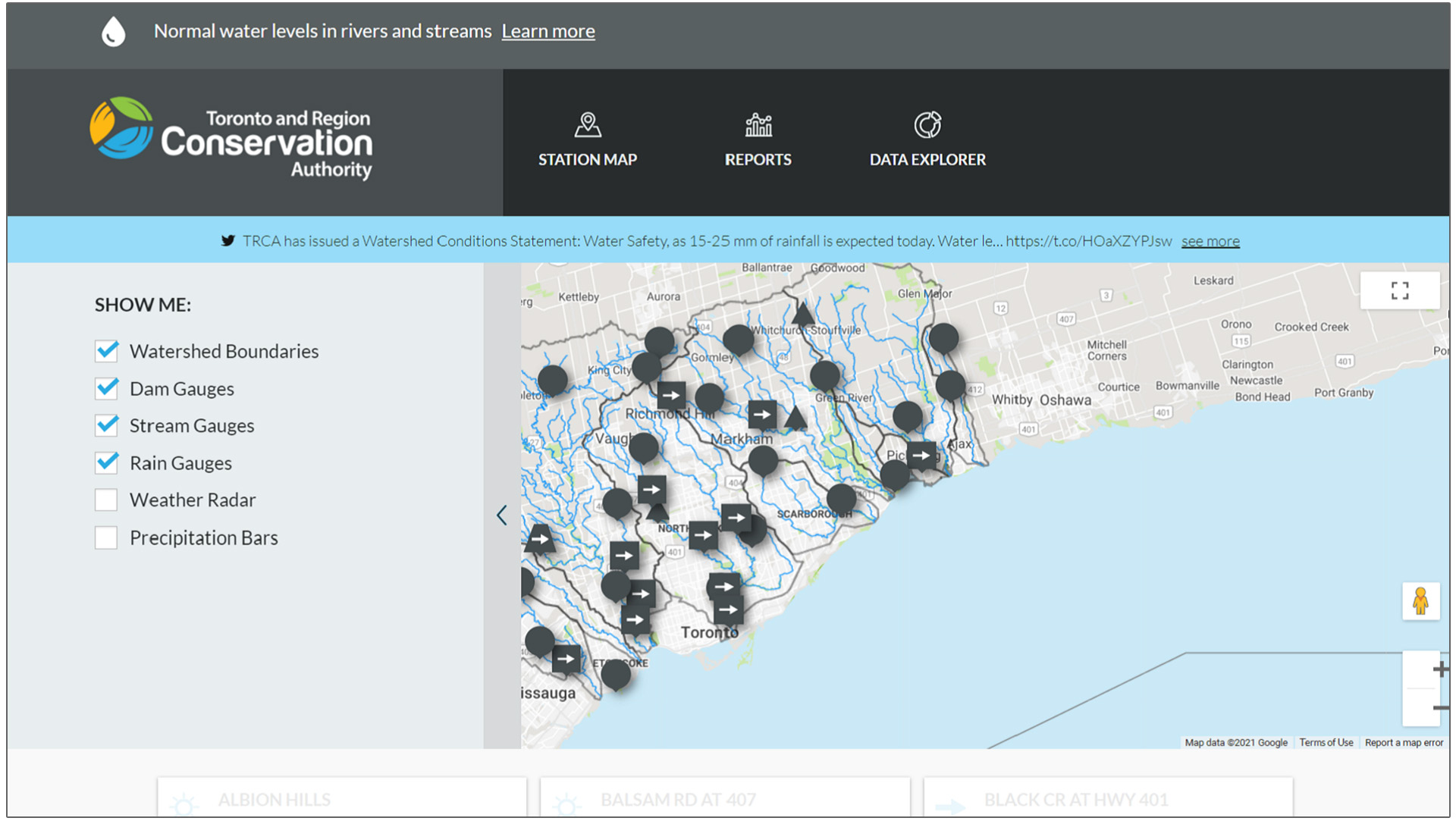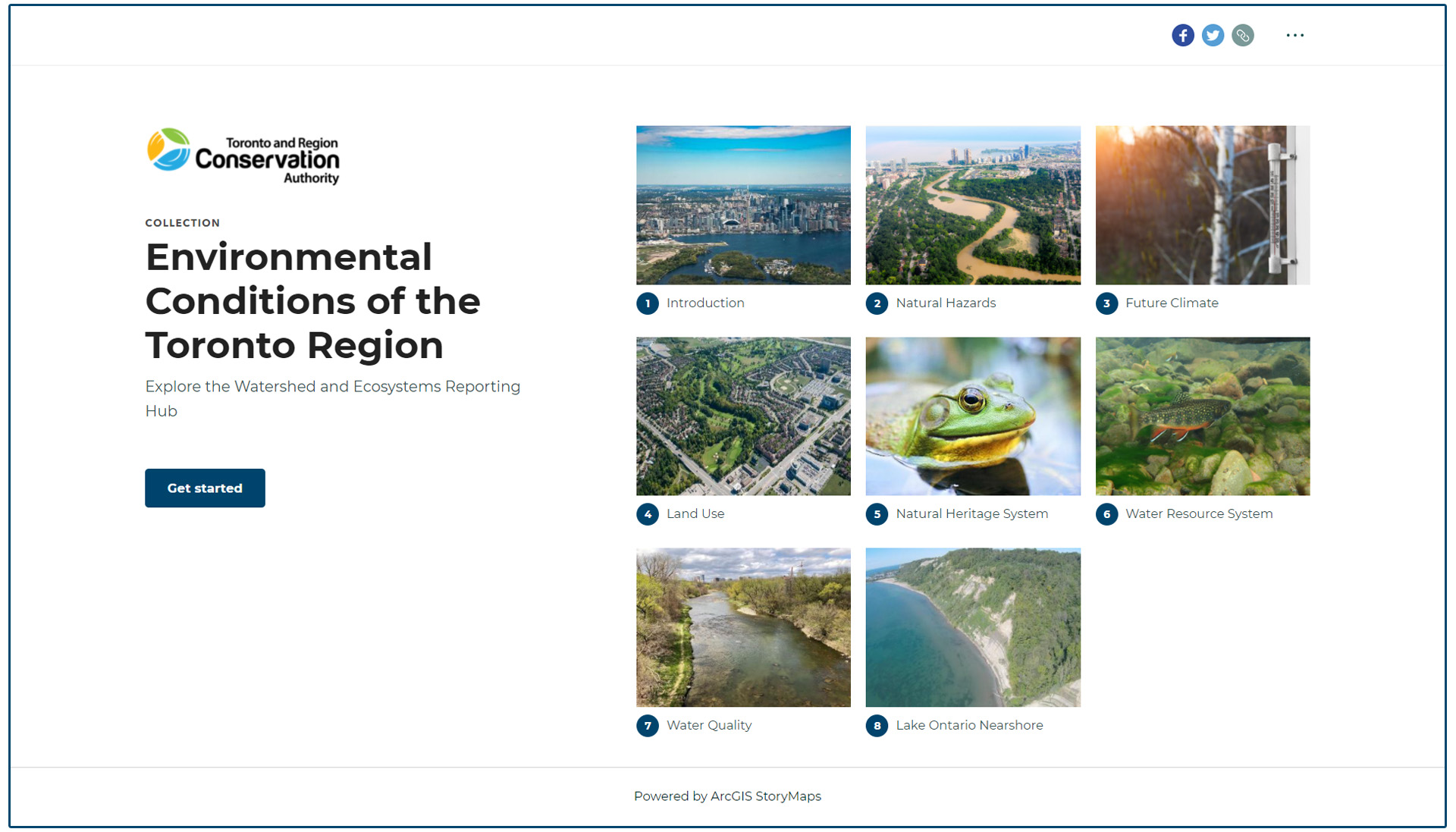Scientific Knowledge Sharing
Evidence-based decision making is at the core of what TRCA does. Several of our Business Units engage in generating new scientific knowledge to support watershed management actions and decisions.
It is critical that the knowledge generated is effectively shared.
The Scientific Knowledge Sharing platform is dedicated to sharing the latest scientific knowledge generated by TRCA and our partners. It is a place where staff can learn about and engage in the scientific work TRCA is undertaking.
PLEASE NOTE: There are several TRCA teams engaged in generating new scientific knowledge. Currently the content on the platform is specific to the Watershed Planning and Ecosystem Science business unit. Additional content from other TRCA teams will be added as the platform develops.
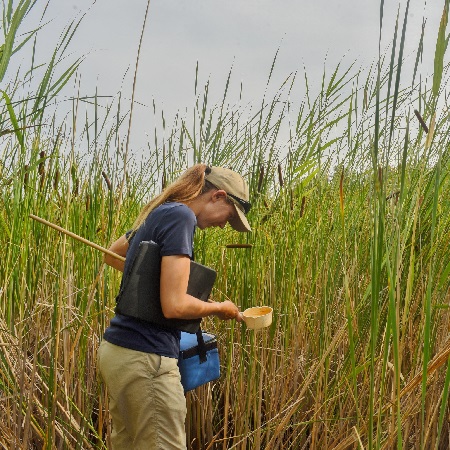
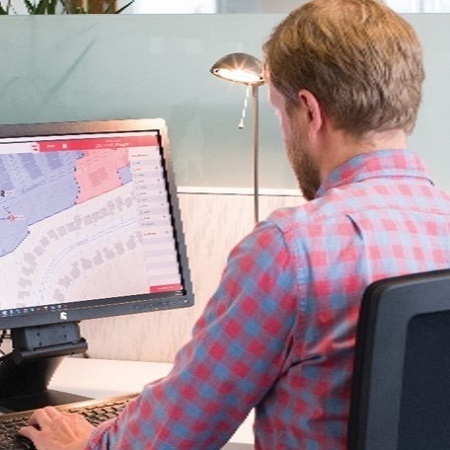
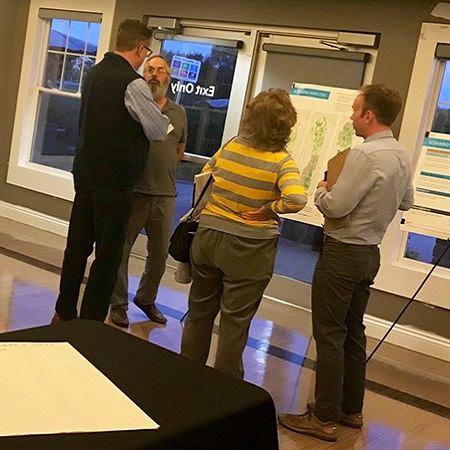
Ultimately, the intent of this hub space is to help TRCA and its municipal partners better apply scientific knowledge in the pursuit of their goals.
The content of the space is updated regularly.
Interested in Adding a Resource to the Platform?
If you have a report, research paper, presentation, or any other kind of resource you would like to share, just use our submission form to have it added to the platform.
A Note on How to Use the Platform
The content on the platform is organized around broad categories. Each category can be filtered based on preset themes to help further refine the outputs.
New content will be highlighted on the right of the platform under Latest Updates. You can also sign up below to receive email updates when new content has been added.
We encourage you to explore the platform, and to reach out to one of the Key Contacts listed in the sidebar to the right if you have any questions.
EXPLORE THE RESOURCE LIBRARY
Monitoring Matters E-Newsletter

• • • •
Development and Engineering Services Blog
TRCA Open Data Portal
At TRCA, we are working towards providing free and open access to our data and information, to improve accountability and ensure transparency into the decision-making process while increasing the public’s understanding of and engagement with the organization.
VISIT TRCA’S OPEN DATA & INFORMATION WEBPAGE
The Planning and Development Procedural Manual provides detailed information about TRCA’s review procedures and submission requirements as part of the development review process. The manual includes a consolidation of all of TRCA’s standards as outlined in technical checklists and guidelines.
Environmental Monitoring Methodologies:
- Evaluation, Classification, and Management of Headwater Drainage Feature Guidelines (January 2014)
- Ontario Benthos Biomonitoring Network Protocol
- Ontario Stream Assessment Protocol
- Terrestrial Protocols
Peel Region Urban Forest Best Practices Guides (October 2021):
- Best Practices and Strategies for the Urban Forest in a Climate Change Context – Executive Summary
- Guide 1: Best Practices Guide for Urban Forest Planning in Peel
- Guide 2: Urban Forest Management Best Practices Guide for Peel
- Guide 3: Guide for Tree and Shrub Standards and Specifications for Regional Roads in Peel
- Guide 4: Potential Street and Park Tree Species for Peel in a Climate Change Context
- Guide 5: Working With Trees: Best Practices for a Resilient Future
VIDEOS:
NEWEST VIDEOS
Our Freshwater is Getting Saltier: How You Can Help
• • • •
The Search for Asian Carp: A Day with the TRCA Monitoring Crew!
• • • •
Night Electrofishing: An Evening with the TRCA Monitoring Crew!
• • • •
Wetland Basics
• • • •
Surface Water Quality Sampling in Toronto and the GTA
• • • •
EARLIER VIDEOS
- Kortright Green Parking Lot
- Rainwater Harvesting: The Archetype Sustainable House
- SAVE Salt Spreader Calibration Training
- Thermal Mitigation of Stormwater Management Pond Outflows Using Geothermal Cooling
- Percolation Test-Measurement and Recording Procedures
• • • •
All TRCA Monitoring Videos
Ecosystem Service Valuation of Toronto’s Parks, Golf Courses, and Open Spaces
Lunch & Learn – February 8, 2023
DOWNLOAD THE SLIDES •VIEW THE CHAT LOG
Identifying Areas Meeting Criteria for Significant Wildlife Habitat in TRCA’s Jurisdiction
Lunch & Learn – January 24, 2023
DOWNLOAD THE SLIDES •VIEW THE CHAT LOG
Dam Safety 101
Lunch & Learn – December 15, 2022
Toronto and Region Conservation Authority Strategic Plan 2023-2034
Lunch & Learn – November 15, 2022
DOWNLOAD THE SLIDES •VIEW THE CHAT LOG
The Work of TRCA’s Planning Policy and Regulation Team:
A TRCA Team Effort
Lunch & Learn – November 1, 2022
DOWNLOAD THE SLIDES •VIEW THE CHAT LOG
• • • •
Great Lakes Coastal Webinar Series
April 4-8, 2022
• • • •
EARLIER PRESENTATIONS
Site Suitability Analysis Using Fuzzy Logic:
A GIS-based Application for Agricultural Best Management Practices (BMPs)
Lunch & Learn – October 17, 2022
WATCH THE VIDEO
• DOWNLOAD THE SLIDES • VIEW THE CHAT LOG
Conducting Carbon Calculations with Clarity and Consistency:
Using the Natural Asset Carbon Assessment Guide and Toolbox
Lunch & Learn – August 24, 2022
WATCH THE VIDEO
• DOWNLOAD THE SLIDES • VIEW THE CHAT LOG
Water Quality Modelling for the Etobicoke Creek Watershed Plan
Lunch & Learn – June 29, 2022
WATCH THE VIDEO
• DOWNLOAD THE SLIDES • VIEW THE CHAT LOG
Durham Climate and Health Scenario Planning Workshop
Webinar – June 22, 2022
WATCH THE VIDEO
• VIEW THE AGENDA • DOWNLOAD THE SLIDES
Natural Systems Climate Change Adaptations: Best Practices Review and Applications
Lunch & Learn – May 26, 2022
WATCH THE VIDEO
• DOWNLOAD THE SLIDES • VIEW THE CHAT LOG
Peel Urban Forest Best Practice Guides
Lunch & Learn – March 29, 2022
WATCH THE VIDEO
• DOWNLOAD THE SLIDES • VIEW THE CHAT LOG
Ontario’s New Excess Soil Regulations
Lunch & Learn – January 26, 2022
WATCH THE VIDEO
• DOWNLOAD THE SLIDES • VIEW THE CHAT LOG
TRCA Ecosystem Compensation Program
Lunch & Learn – December 15, 2021
WATCH THE VIDEO
• DOWNLOAD THE SLIDES • VIEW THE CHAT LOG
Canada in a Changing Climate National Issues Report: Water Resources Chapter
Lunch & Learn – November 25, 2021
WATCH THE VIDEO
• DOWNLOAD THE SLIDES • VIEW THE CHAT LOG
Carruthers Creek Watershed Plan
Lunch & Learn – October 26, 2021
WATCH THE VIDEO
• DOWNLOAD THE SLIDES • VIEW THE CHAT LOG
TRCA Road Ecology Program
Lunch & Learn – September 14, 2021
WATCH THE VIDEO
• DOWNLOAD THE SLIDES • VIEW THE CHAT LOG
Getting to Know Grasses: Introduction to Grass Identification
Webinar for City of Toronto Stewardship Program – August 5, 2021
WATCH THE VIDEO
Broadview and Eastern Municipal Class EA and Port Lands Flood Protection Implementation
Lunch & Learn – August 4, 2021
WATCH THE VIDEO • DOWNLOAD THE SLIDES • VIEW THE CHAT LOG
TRCA Water Resource System
Lunch & Learn – July 14, 2021
WATCH THE VIDEO • DOWNLOAD THE SLIDES • VIEW THE CHAT LOG
Watershed and Ecosystem Reporting Hub: Introduction and Demo
Lunch & Learn – June 23, 2021
WATCH THE VIDEO • DOWNLOAD THE SLIDES • VIEW THE CHAT LOG
Long-Term Monitoring of Four Lake Ontario Coastal Wetlands
Lunch & Learn – June 9, 2021
WATCH THE VIDEO • DOWNLOAD THE SLIDES • VIEW THE CHAT LOG
Wetlands, Warehouses or Both? The Story of Project Lonestar and the Lower Duffins Wetland Complex
Lunch & Learn – May 12, 2021
WATCH THE VIDEO • DOWNLOAD THE SLIDES • VIEW THE CHAT LOG
Intro to eDNA – Applications, Advantages, and Implications
Lunch & Learn – May 6, 2021
WATCH THE VIDEO • VIEW THE CHAT LOG
Lake Ontario Restoration Initatives
Lunch & Learn – April 27, 2021
WATCH THE VIDEO • VIEW THE CHAT LOG
Lake Ontario Fish and Aquatic Ecosystem Health
Lunch & Learn – April 21, 2021
WATCH THE VIDEO • VIEW THE CHAT LOG
Thermal Imaging for Conservation and Restoration
Lunch & Learn – April 14, 2021
WATCH THE VIDEO • DOWNLOAD THE SLIDES • VIEW THE CHAT LOG
Natural Heritage System Update
Lunch & Learn – March 24, 2021
WATCH THE VIDEO • DOWNLOAD THE SLIDES • VIEW THE CHAT LOG
Research in the Meadoway
Lunch & Learn – February 10, 2021
WATCH THE VIDEO • DOWNLOAD THE SLIDES • VIEW THE CHAT LOG
Erosion Risk Management
Lunch & Learn – January 27, 2021
WATCH THE VIDEO • DOWNLOAD THE SLIDES • VIEW THE CHAT LOG
Toronto Waterfront Aquatic Habitat Restoration
Lunch & Learn – January 14, 2021
WATCH THE VIDEO • DOWNLOAD THE SLIDES • VIEW THE CHAT LOG
Exploring TRCA’s Biodiversity
Lunch & Learn – December 16, 2020
WATCH THE VIDEO • DOWNLOAD THE SLIDES • VIEW THE CHAT LOG
Green Infrastructure Asset Management Planning
Lunch & Learn – December 8, 2020
WATCH THE VIDEO • DOWNLOAD THE SLIDES • VIEW THE CHAT LOG
Working with Indigenous Communities
Lunch & Learn – November 17, 2020
WATCH THE VIDEO • DOWNLOAD THE SLIDES • VIEW THE CHAT LOG
TRCA’s Recent Floodplain Mapping Updates
Lunch & Learn – November 10, 2020
WATCH THE VIDEO • DOWNLOAD THE SLIDES
Introduction to the LID Treatment Train Tool
Lunch & Learn – November 5, 2020
WATCH THE VIDEO • DOWNLOAD THE SLIDES
Watersheds and Ecosystems Reporting Web Application
Lunch & Learn – September 21, 2020
WATCH THE VIDEO • DOWNLOAD THE SLIDES
LEARN MORE
TRCA’s Watershed and Ecosystems Reporting Hub
TRCA’s new Watershed and Ecosystems Reporting Hub allows the user to interactively explore information about watersheds and the waterfront in the Toronto region.
The Hub identifies current conditions by themes, and explains the importance of different environmental indicators for understanding watershed and ecosystem health. It also shows how conditions are changing over time.
If you are interested in learning more about TRCA’s Watershed and Ecosystems Reporting Hub, please contact Laura DelGiudice.
• • • •
TRCA Environmental Monitoring
The Regional Watershed Monitoring Program (RWMP) and Lake Ontario Monitoring programs are ongoing programs developed by TRCA and its partners to provide a comprehensive, integrated, and coordinated approach to environmental monitoring within TRCA’s watersheds and nearshore Lake Ontario.
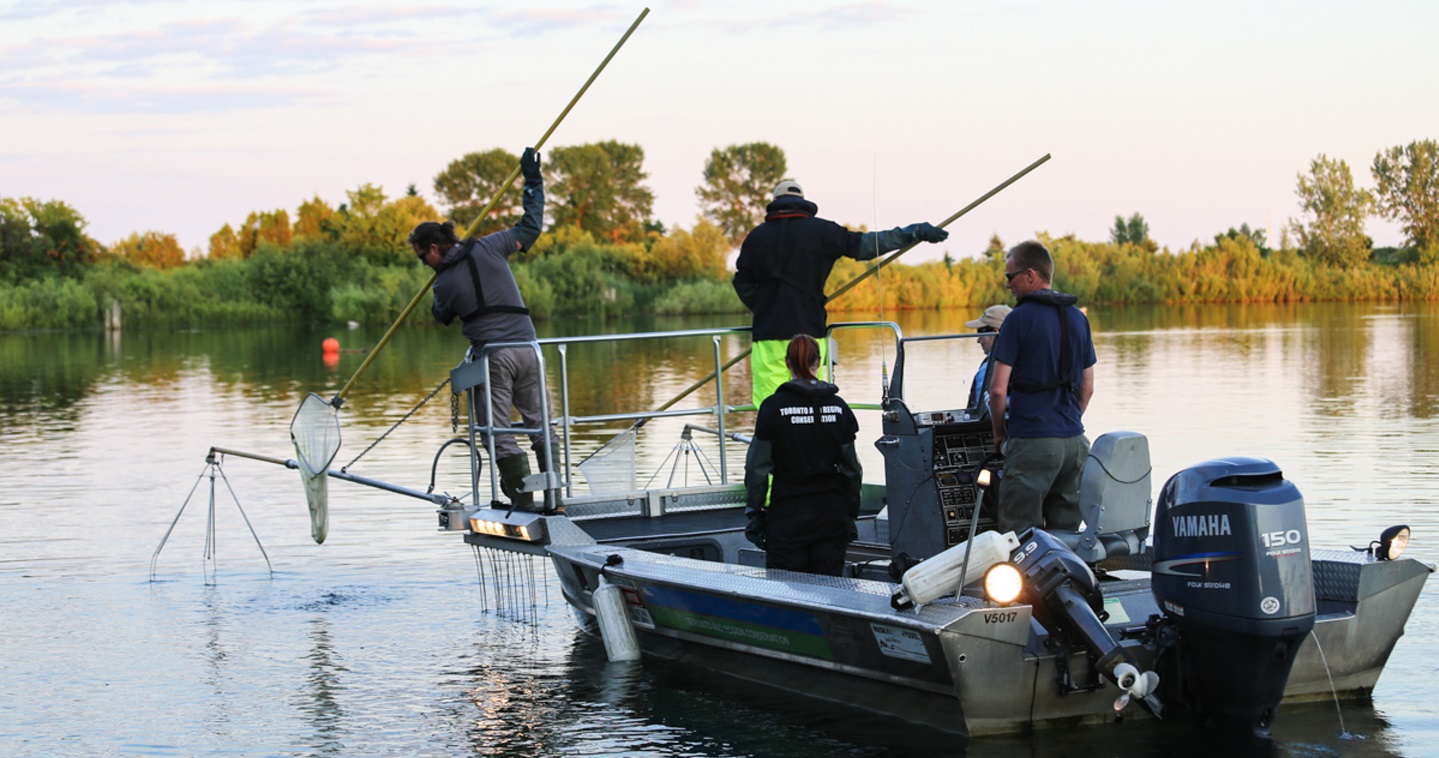
This monitoring builds on the existing local and project-specific monitoring efforts of TRCA and its partners, and is key to assessing, cataloguing and reporting on the state, condition, and trends in terrestrial and aquatic biodiversity throughout TRCA’s jurisdiction.
TRCA’s comprehensive data collection and analysis capabilities increase standardization, reduce risk, and ensure predictable and cost-effective operations supporting a number of initiatives, including environmental restoration, scientific research, policy and regulatory support, and watershed reporting.
• • • •
About the Research and Science Working Group
Ecosystem and sustainability research is critical to informing the actions and decisions of TRCA, its partner municipalities, and other provincial and federal agencies.
Many teams across TRCA are involved in collecting data, undertaking research, interpreting, and presenting data, or applying scientific techniques and practices. The Research and Science working group facilitates a coordinated approach to generating and disseminating the most relevant evidence-based knowledge to support decision making and enable TRCA and its partners to achieve their strategic goals and objectives.
The working group is made up of staff from across the organization involved in generating, sharing, and applying scientific knowledge. The working group meets regularly throughout the year.
If you are interested in learning more about the working group or bringing an item forward to a future meeting, please contact Noah Gaetz.
• • • •
About the TRCA Research Agenda
To strengthen TRCA’s capacity to gather, generate, use, and share up-to-date and relevant scientific knowledge and to affect meaningful change, it is important to remain at the forefront of applied research initiatives and be effective in translating data into knowledge that can be used by practitioners. This requires a proactive and strategic approach to identifying and filling existing knowledge gaps.
A TRCA Research Agenda has been developed to address these needs.
The overarching goal of TRCA’s Research Agenda is to provide a strategic and proactive tool to staff that outlines critical knowledge gaps that can be addressed through collaborative and coordinated applied research initiatives. This, in turn, will strengthen TRCA’s capacity to undertake science-based decision making.
The TRCA Research Agenda has four main objectives:
- Develop and maintain an up-to-date curated list of TRCA’s priority research questions based on current knowledge gaps
- Track TRCA’s efforts to fill the identified gaps through applied research initiatives and partnerships
- Help communicate the knowledge generated to broader audiences and stakeholders internally and externally
- Facilitate internal engagement, collaboration, and coordination while undertaking applied research initiatives
To learn more about the TRCA Research Agenda, please contact Namrata Shrestha or Meaghan Eastwood.
• • • •
Sustainable Technologies Evaluation Program (STEP)
The Sustainable Technologies Evaluation Program (STEP) is a multi-agency initiative that supports implementation of sustainable technologies and practices within Canada. STEP works to achieve this by:
- Carrying out research, monitoring and evaluation of clean water and low carbon technologies
- Assessing technology implementation barriers and opportunities
- Developing supporting tools, guidelines, and policies
- Delivering education and training programs
- Advocating for effective sustainable technologies
- Collaborating with academic and industry partners through our Living Labs and other initiatives
Technologies evaluated under STEP are not limited to physical devices or products; they may also include preventative measures, implementation protocols, alternative urban site designs, and other innovative practices that help create more sustainable and liveable communities.
STEP also acts as a third-party verifier for the Environmental Technology Verification (ETV) process. ETV provides independent evaluation of new technologies to validate environmental claims so that users, developers, regulators, and other parties can make informed decisions about purchasing, applying, and regulating innovative technologies.
STEP Water Resource Library STEP Energy Resource Library
• • • •
Oak Ridges Moraine Groundwater Program
Across south-central Ontario, a coalition of government agencies and local consulting companies are working together to better understand and manage water resources.
With the Oak Ridges Moraine as a central landscape feature, the program’s database and interpretations stretch from the Halton and Nottawasaga Watersheds in the west to the Trent River in the east, and reach from the shores of Lake Ontario northwards to beyond Lake Simcoe and the Kawartha Lakes.
Agencies and consultants look to the data to provide the regional geological and hydrogeological context for their ongoing technical studies and management initiatives.
Any TRCA staff can obtain a login to access the tools and data. Contact Steve Holysh for login credentials.
• • • •
Interested in Receiving Research and Science Updates?
Just complete the form below to sign up!
